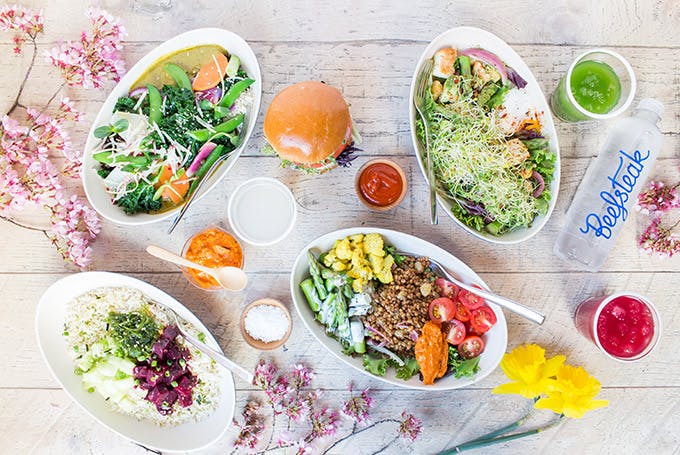Meet The Vegetable Whisperer Who Has The Ear Of José Andrés
ThinkFoodGroup's chief of produce, Bennett Haynes, helps the award-winning chef stay fresh
"We've been dealing with this Belgian endive issue for weeks," Bennett Haynes says en route to Little Wild Things, the Washington D.C. urban farm that usually sells the locally grown sunflower shoots without a hitch. There was also a strawberry snag recently: Weeks of heavy rain had caused the berries to rapidly ripen to the point that they'd be rotten by the time they reached the restaurants. He was going to have to explain to his chefs that the start-of-summer samples he had promised would have to wait a week.
These are the scenarios Haynes deals with on a daily basis as the chief of produce for acclaimed chef and restaurateur José Andrés's ThinkFoodGroup.
ThinkFoodGroup's fast-casual chain, Beefsteak, is Haynes's main priority—since the menu is completely vegetable driven and the volume is high—but he also uses his experience as a small-scale organic farmer to help chefs at the company's fine dining spots, Minibar and Zaytinya, effectively source heirloom tomatoes and edible flowers, with an eye toward supporting local growers as much as possible.
"I think that's where José and TFG saw an opportunity," he says. "Like, we need a guy who understands this from the produce side, who can kind of translate it to our chefs."
But what exactly does a vegetable boss for one of the world's most famous chefs do?
Before taking the job just less than two years ago, Haynes cut his teeth in Thailand for an organic farmers' movement. Then, for six years, he ran his own small organic farm near Morristown, New Jersey. Operating a CSA (Community Supported Agriculture) program was his focus at first, but he soon branched out to selling to chefs at New York City restaurants like Uncle Boons and Pok Pok NY. "I thought, 'I'm going to be the guy who grows whole-plant cilantro, because Thai restaurants use the roots,'" he explains. "I knew I could be their cilantro guy as long as I had it on hand and the quality was what it needed to be."
The experience gave him intimate knowledge of what makes relationships between farmers and chefs work—and what causes them to fail.
It's an understanding that producers like Little Wild Things' Chelsea Barker appreciate. "It was great, because we started speaking the same language right away," she says of the process of getting her sunflower shoots onto the menu at Beefsteak. To other fast-casual restaurants, the relationship proved what the small urban farm was capable of and, ultimately, allowed it to expand to other accounts, too, which is exactly the kind of outcome that excites Haynes, since he's also naturally passionate about supporting small producers and expanding the capacity of the local foodshed.
At Beefsteak, which has six outposts including its newest location in Cleveland, Ohio, the menu changes three times a year to accommodate seasonal ingredients, like the sugar snap peas currently served in the Little Wild Curry bowl. He prioritizes local sources, and then looks further afield for staples like broccoli and cherry tomatoes.
Showcasing produce is a part of the job, too. In addition to Beefsteak's cheeky dancing-veggie wallpaper, Haynes partnered with Farmshelf, an urban farming start-up that builds vertical grow systems in restaurants so customers can see fresh herbs growing in-house as they eat. At the George Washington University location, the cilantro is currently flourishing.

And for chefs at spots like Washington D.C.'s Oyamel, Haynes acts as a middleman, lending his knowledge when a chef can't find a source for a specific vegetable or is unsatisfied with a producer. Instead of just cutting off the relationship, he says, there are often ways he can talk to the farmer to find out if there's a way to fix the problem.
As for working directly with Andrés, the 2018 recipient of the James Beard Humanitarian of the Year award?
Face-to-face time with Andrés is unpredictable, Haynes says, but his impact on the chef's life literally hits home. Each week, he's at Andrés's house checking on the garden, where he plants tomatoes (a lot of beefsteaks, predictably), peppers, carrots, cauliflower, herbs and more for the chef and his wife and daughters to cook and enjoy.
Last year, he remembers, Andrés told him not to plant potatoes, because he didn't think they'd grow well in a home garden. Haynes had gorgeous purple potatoes already sprouting in his kitchen and couldn't resist. "I was like, 'Dude, you love potatoes, so potatoes are what you're going to get.'"
Lisa Elaine Held is a New York City-based journalist who writes about food, farming, sustainability and health. Follow her on Instagram or Twitter.
